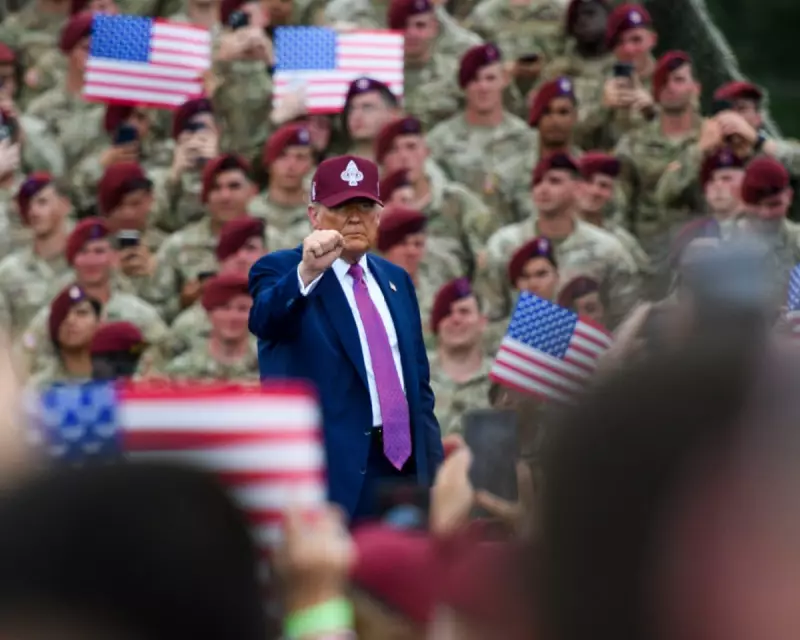
Americans facing numerous concerns from economic hardship to travel disruptions now confront an even more alarming development involving an institution rarely discussed in democracy debates: their military establishment.
The Loyalty Purge in Military Ranks
While acknowledging legitimate criticisms of US imperialism and the expanding national security apparatus, most observers agree that military neutrality in political matters remains crucial for democratic stability. However, a disturbing pattern has emerged under the Trump administration.
Donald Trump is systematically purging higher military ranks based on personal prejudices and demands for absolute loyalty, effectively transforming the armed forces into both partisan instrument and political prop. More dangerously, the president is instilling what analysts describe as a "logic of impunity" that characterises his entire governance approach.
Senior figures perceived as too close to Trump critics, including General Mark Milley, have experienced delayed or cancelled promotions. Those targeted by far-right influencers face professional retaliation in what appears to be a coordinated effort to reshape military leadership.
Performance Over Principle
The administration's approach reached new heights when Trump used MAGA-aligned soldiers as background props during a Fort Bragg speech, blatantly violating longstanding norms against instrumentalising state institutions for partisan purposes.
Each norm violation serves as a loyalty test, with critics effectively identifying themselves through their objections to these breaches. The strategy creates a self-reinforcing cycle where only the most compliant officers advance.
Even more concerning are reports of illegal orders, such as attacking boats in Caribbean waters, that morally compromise those who carry them out and potentially expose them to criminal prosecution. This generates powerful incentives for military personnel to ensure Trumpist continuity in power.
Simultaneously, prominent pardons - most recently for those involved in attempts to overturn the 2020 election - establish clear promises of impunity for political allies. As numerous observers have noted, under this system, law protects MAGA faithful without binding them, while the president's declared enemies find themselves bound by law without its protection.
From Television to Pentagon
The influence of figures like Pete Hegseth illustrates how performative politics has infiltrated military culture. Hegseth's transition from Fox News commentator to Pentagon insider brought with it a focus on branding through distinctive dress and hyperbolic speeches filled with alliteration.
This approach suggests that words drive thinking rather than careful thought leading to appropriate word selection. The substitution of "lethality" for "legality" exemplifies this troubling linguistic shift.
Eighteenth-century writer Mary Wollstonecraft surprisingly compared stereotypes about women with certain types of soldiers in standing armies. She observed that soldiers might "acquire manners before morals" and that "like the fair sex, the business of their life is gallantry."
Contemporary parallels emerge not in questions of effeminacy but in the manufactured "warrior ethos" that resembles television affectation more than genuine military doctrine. The emphasis on hand-to-hand combat as essence of 21st-century warfare seems particularly anachronistic.
Even physical appearance becomes political, with Hegseth prioritising removal of personnel deemed overweight. Trump himself reduced military leadership to "central casting" when viewing officers assembled in Virginia last September.
Normalising Military Presence
Deploying soldiers in Democratic-led cities serves purposes beyond mere political theatre. This strategy normalises military presence in civilian spaces, blurs distinctions between military and civilian life, and sends messages that citizens might be treated as enemies.
As Israeli scholar Avishay Ben Sasson-Gordis argues, these deployments fundamentally alter civil-military relationships. The situation grows more confusing as uniformed personnel from different units operate with unclear authorisation chains.
The Pentagon and Department of Homeland Security receive explicit encouragement to operate in "lockstep" as part of shared "homeland mission," creating what political scientist Dan Moynihan terms the "omniforce."
This omnipresent military combined with what James Madison called an "overgrown executive" represents precisely the concentration of power that American founders feared most.
Impunity and Personal Loyalty
The consequences are twofold: impunity becomes more likely when unidentified operatives avoid accountability, while the omniforce increasingly resembles Trump's personal creation and loyal guard.
Investigations reveal that at least six Trump political appointies currently reside in military housing, reinforcing the image of Trump as padrone. This perception strengthened when the president attempted to redirect congressionally appropriated funds to pay soldiers during government shutdowns.
The spectacle of pro-regime oligarchs funding military operations with private wealth completes this troubling picture. Similar moves appear in other aspiring autocracies, though at smaller scales.
Hungarian Prime Minister Viktor Orbán established a special counter-terror unit headed by his former bodyguard, widely perceived as primarily loyal to the prime minister rather than state institutions.
Historical Parallels and Democratic Survival
Many recall the great democratisation waves of the 1970s and 1980s while forgetting how easily outcomes might have differed. The military's role in democratic transitions often proves critical, not only when juntas relinquish power but when individuals make courageous moral choices.
In Chile, Augusto Pinochet prepared to declare emergency powers and maintain control by force after losing the 1988 plebiscite. General Fernando Matthei rejected this plan and informed journalists that Pinochet had genuinely lost the vote.
While the United States differs significantly from Chile, the question of what uniformed personnel will do during democracy's pivotal moments grows more relevant daily. The integrity of military institutions and their resistance to politicisation may well determine the future of American democracy itself.





